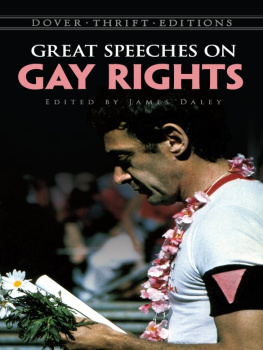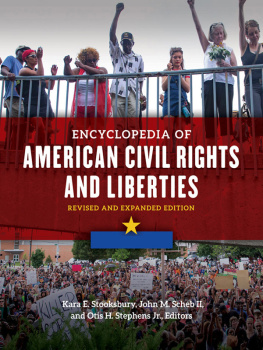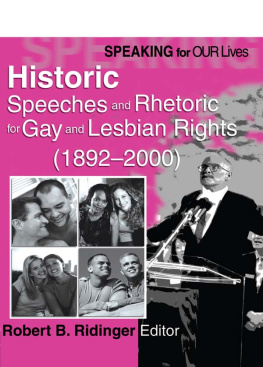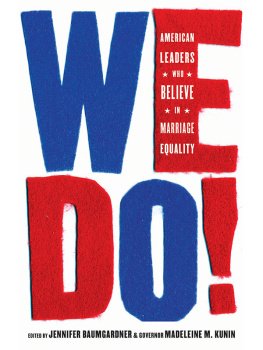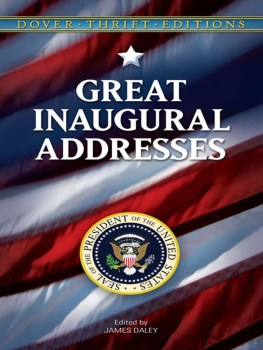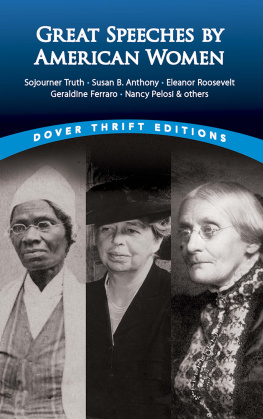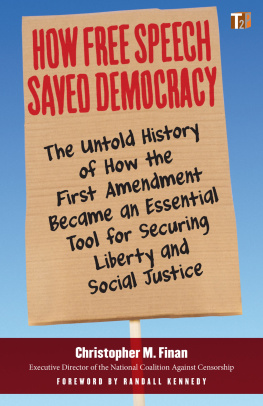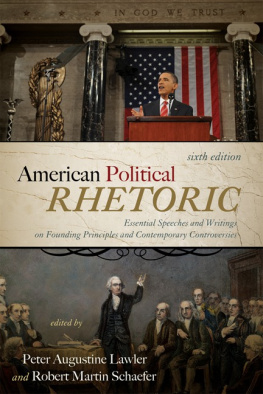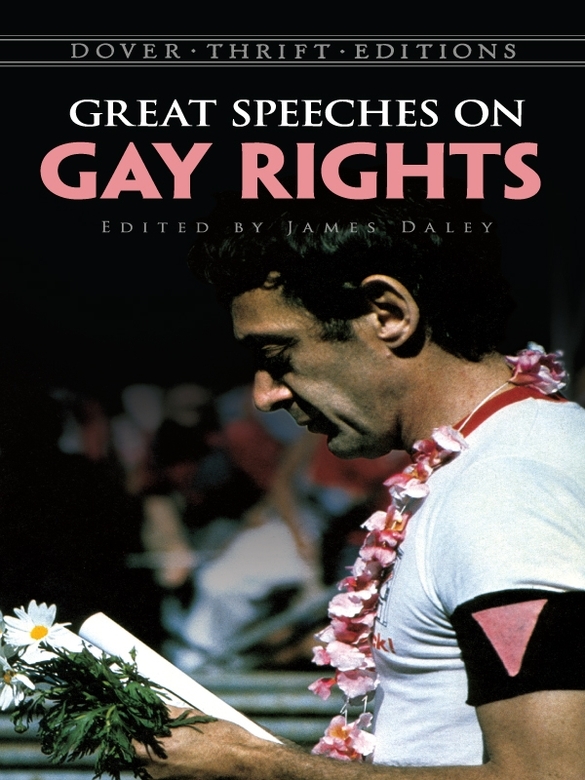August Bebelss Address at the Reichstag courtesy of John Lauritsen, copyright 1978; Kurt Hillers A 1928 Gay Rights Speech courtesy of John Lauritsen, published in John Lauritsen and David Thorstads The Early Homosexual Rights Movement: 18641935, Times Change Press, Second Revised Edition, 1995.
Franklin Kamenys Civil Liberties: A Progress Report courtesy of Franklin Kameny.
Elizabeth Birchs Text of First Convention Speech by a Gay Organizations Leader, Eric Rofess The Emerging Sex Panic Targeting Gay Men, Jack Nicholss Why I Joined the Movement, and Jim Kepners Why Cant We All Get Together, and What Do We Have in Common? all courtesy of GayToday.com
Harvey Milks The Hope Speech courtesy of the San Francisco Public Library.
Sue Hydes We Gather in Dubuque copyright 1988 by Sue Hyde; courtesy of Sue Hyde.
Urvashi Vaids Speech at the March on Washington courtesy of Urvashi Vaid.
Sally Gearharts The Lesbian and God-the-Father courtesy of Sally Gearhart.
Anna Ruelings What interest does the womens movement have in solving the homosexual problem? courtesy of Michael Lombardi-Nash, who also did the translation.
Robert G. Ingersoll
Address at the Funeral of Walt Whitman (Camden, New Jersey, March 30, 1892)
Robert Green Ingersoll [18331899] was a noted agnostic, a political leader in the Republican Party, one of the most highly acclaimed orators of the nineteenth century, and a close friend of Walt Whitman. He gave this speech before a crowd of several thousand at Whitmans funeral services at the Harleigh Cemetery in Camden, New Jersey.
AGAIN, WE, in the mystery of Life, are brought face to face with the mystery of Death. A great man, a great American, the most eminent citizen of this Republic, lies dead before us, and we have met to pay tribute to his greatness and his worth.
I know he needs no words of mine. His fame is secure. He laid the foundations of it deep in the human heart and brain. He was, above all I have known, the poet of humanity, of sympathy. He was so great that he rose above the greatest that he met without arrogance, and so great that he stooped to the lowest without conscious condescension. He never claimed to be lower or greater than any of the sons of men.
He came into our generation a free, untrammeled spirit, with sympathy for all. His arm was beneath the form of the sick. He sympathized with the imprisoned and despised, and even on the brow of crime he was great enough to place the kiss of human sympathy.
One of the greatest lines in our literature is his, and the line is great enough to do honor to the greatest genius that has ever lived. He said, speaking of an outcast, Not until the sun excludes you will I exclude you.
His charity was as wide as the sky, and wherever there was human suffering, human misfortune, the sympathy of Walt bent above it as the firmament bends above the earth.
He was built on a broad and splendid planample, without appearing to have limitationspassing easily for a brother of mountains and seas and constellations; caring nothing for the little maps and charts with which timid pilots hug the shore, but giving himself freely with the recklessness of genius to winds and waves and tides; caring for nothing so long as the stars were above him. He walked among men, among writers, among verbal varnish-ers and veneerers, among literary milliners and tailors, with the unconscious majesty of an antique god.
He was the poet of that divine democracy which gives equal rights to all the sons and daughters of men. He uttered the great American voice; uttered a song worthy of the great Republic. No man has ever said more for the rights of humanity, more in favor of real democracy, of real justice. He neither scorned nor cringed; was neither tyrant nor slave. He asked only to stand the equal of his fellows beneath the great flag of nature, the blue and the stars.
He was the poet of life. It was a joy simply to breathe. He loved the clouds; he enjoyed the breath of morning, the twilight, the winds, the winding streams. He loved to look at the sea when the waves burst into the whitecaps of joy. He loved the fields, the hills; he was acquainted with the trees, with birds, with all the beautiful objects of the earth. He not only saw these objects, but understood their meaning, and he used them that he might exhibit his heart to his fellow men.
He was the poet of Love. He was not ashamed of that divine passion that has built every home; that divine passion that has painted every picture and given us every real work of art; that divine passion that has made the world worth living in and has given some value to human life.
He was the poet of the natural, and taught men not to be ashamed of that which is natural. He was not only the poet of democracy, not only the poet of the great Republic, but he was the poet of the human race. He was not confined to the limits of this country, but his sympathy went out over the seas to all the nations of the earth.
He stretched out his hands and felt himself the equal of all kings and of all princes, and the brother of all men, no matter how high, no matter how low.
He has uttered more supreme words than any writer of our century, possibly of almost any other. He was, above all things, a man, and above genius, above all the snow-capped peaks of intelligence, above all art, rises the true man.
He was the poet of Death. He accepted all life and all death, and he justified all. He had the courage to meet all, and was great enough and splendid enough to harmonize all and to accept all there is as divine melody.
You know better than I what his life has been, but let me say one thing: Knowing as he did, what others can know and what can not, he accepted and absorbed all theories, all creeds, all religions, and believed in none. His philosophy was a sky that embraced all clouds and accounted for all clouds. He had a philosophy and a religion of his own, broader, as he believedand as I believethan others. He accepted all, he understood all, and he was above all.
He was absolutely true to himself. He had frankness and courage, and he was as candid as light. He was willing that all the sons of man should be absolutely acquainted with his heart and brain. He had nothing to conceal. Frank, candid, pure, serene, noble, and yet for years he was maligned and slandered simply because he had the candor of nature. He will be understood yet, and that for which he was condemned his frankness, his candorwill add to the glory and greatness of his fame.
He wrote a liturgy for mankind; he wrote a great and splendid psalm of life, and gave to us the gospel of humanitythe greatest gospel that can be preached.
He was not afraid to live; not afraid to die. For many years he and Death lived near neighbors. He was always willing and ready to meet and greet this king called Death, and for many months he sat in the deepening twilight waiting for the night, waiting for the light.
He never lost his hope. When the mists filled the valleys, he looked upon the mountain tops, and when the mountains in darkness disappeared, fixed his gaze upon the stars.
In his brain were the blessed memories of the day and in his heart were mingled the dawn and dusk of life.
He was not afraid; he was cheerful every moment. The laughing nymphs of day did not desert him. They remained that they might clasp the hands and greet with smiles the veiled and silent sisters of the night. And when they did come, Walt Whitman stretched his hand to them. On one side were the nymphs of day, and on the other the silent sisters of the night, and so, hand in hand, between smiles and tears, he reached his journeys end.

